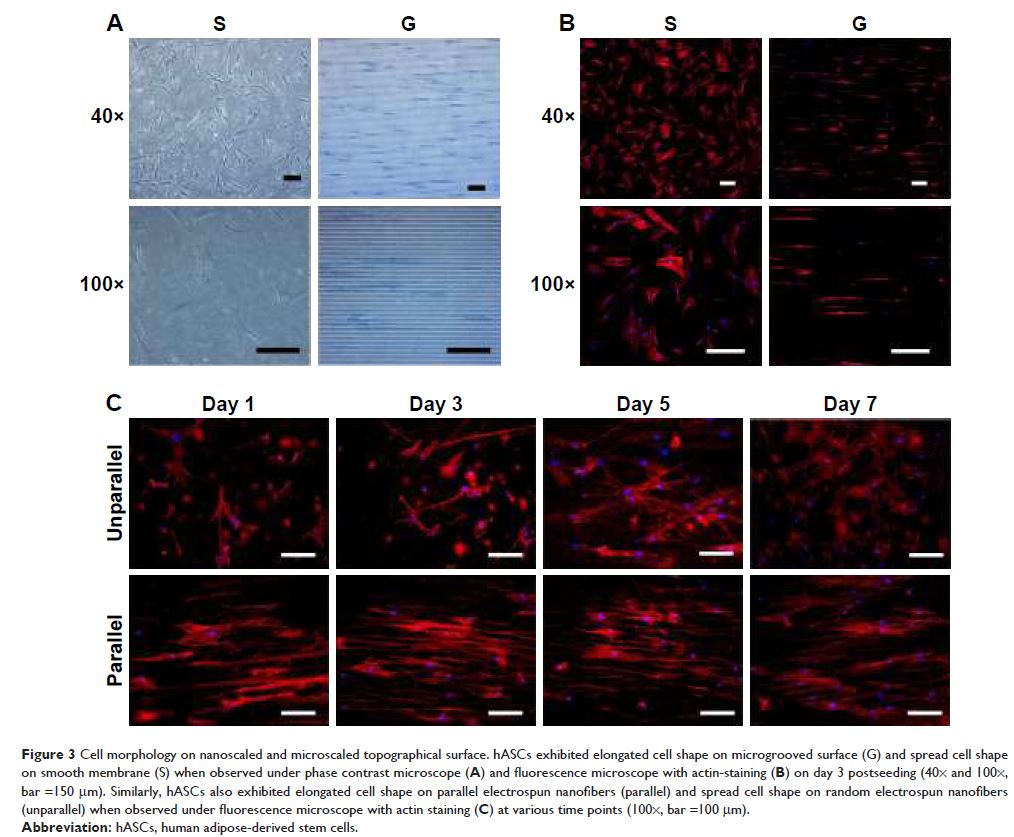108605
论文已发表
注册即可获取德孚的最新动态
IF 收录期刊
- 3.4 Breast Cancer (Dove Med Press)
- 3.2 Clin Epidemiol
- 2.6 Cancer Manag Res
- 2.9 Infect Drug Resist
- 3.7 Clin Interv Aging
- 5.1 Drug Des Dev Ther
- 3.1 Int J Chronic Obstr
- 6.6 Int J Nanomed
- 2.6 Int J Women's Health
- 2.9 Neuropsych Dis Treat
- 2.8 OncoTargets Ther
- 2.0 Patient Prefer Adher
- 2.2 Ther Clin Risk Manag
- 2.5 J Pain Res
- 3.0 Diabet Metab Synd Ob
- 3.2 Psychol Res Behav Ma
- 3.4 Nat Sci Sleep
- 1.8 Pharmgenomics Pers Med
- 2.0 Risk Manag Healthc Policy
- 4.1 J Inflamm Res
- 2.0 Int J Gen Med
- 3.4 J Hepatocell Carcinoma
- 3.0 J Asthma Allergy
- 2.2 Clin Cosmet Investig Dermatol
- 2.4 J Multidiscip Healthc

纳米尺度和微尺度的平行地形图促进 ASC 的体外分化和体外新生成
Authors Zhou KL, Feng B, Wang WB, Jiang YK, Zhang W, Zhou GD, Jiang T, Cao YL, Liu W
Received 3 January 2018
Accepted for publication 28 March 2018
Published 4 July 2018 Volume 2018:13 Pages 3867—3881
DOI https://doi.org/10.2147/IJN.S161423
Checked for plagiarism Yes
Review by Single-blind
Peer reviewers approved by Dr Cristina Weinberg
Peer reviewer comments 2
Editor who approved publication: Dr Lei Yang
Background: Topography at different scales plays an important role in
directing mesenchymal stem cell differentiation including adipose-derived stem
cells (ASCs) and the differential effect remains to be investigated.
Purpose: This study aimed to investigate the similarity and difference
between micro- and nanoscaled aligned topography for inducing tenogenic
differentiation of human ASCs (hASCs).
Methods: Parallel microgrooved PDMS membrane and a parallel aligned
electrospun nanofibers of gelatin/poly-ε-caprolactone mixture were employed as
the models for the study.
Results: Aligned topographies of both microscales and nanoscales could
induce an elongated cell shape with parallel alignment, as supported by
quantitative cell morphology analysis (cell area, cell body aspect, and cell
body major axis angle). qPCR analysis also demonstrated that the aligned
topography at both scales could induce the gene expressions of various
tenogenic markers at the 7th day of in vitro culture including tenomodulin , collagen I and collagen VI , decorin , tenascin-C and biglycan , but with upregulated
expression of scleraxis and tenascin-C only in
microscaled topography. Additionally, tenogenic differentiation at the 3rd day
was confirmed only at microscale. Furthermore, microscaled topography was
confirmed for its tenogenic induction at tissue level as neotendon tissue was
formed with the evidence of mature type I collagen fibers only in parallel
aligned polyglycolic acid (PGA) microfibers after in vitro culture with mouse
ASCs. Instead, only fat tissue was formed in random patterned PGA
microfibers.
Conclusion: Both microscaled and nanoscaled aligned topographies could induce
tenogenic differentiation of hASCs and micro-scaled topography seemed better
able to induce elongated cell shape and stable tenogenic marker expression when
compared to nanoscaled topography. The microscaled inductive effect was also
confirmed at tissue level by neotendon formation in vitro.
Keywords: microscales and nanoscales, aligned topography, human
adipose-derived stem cells, tenogenic differentiation, microscaled PGA fibers
